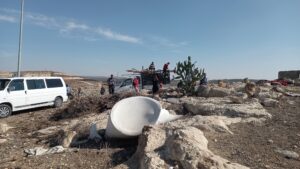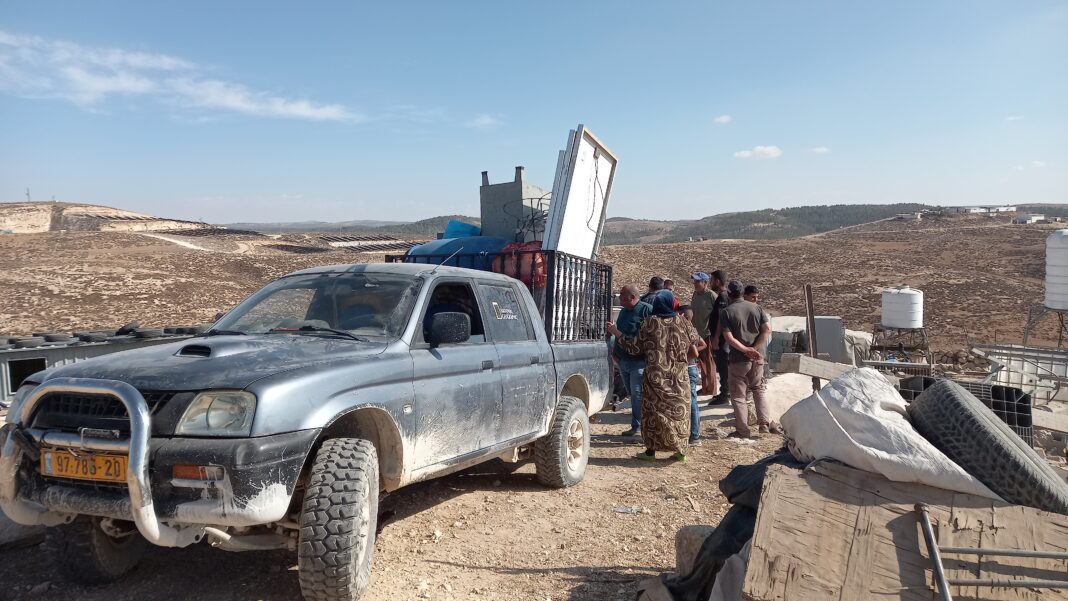by Chiara Cruciati* (from West Bank)
It’s easy to get lost in the maze of alleyways of the Dheisheh refugee camp, which covers one square kilometre and is home to 15,000 people. Built uphill and colourful, with bright blue shop shutters and murals by cartoonist Naji al-Ali, political posters and tiny gardens planted by refugees in the backyards of their homes, with olive trees, fruit trees and roses all around, the camp sits on land leased for 99 years by United Nations Relief and Works Agency for Palestine Refugees in the Near East (UNRWA) from Palestinian families in Doha, a suburb of Bethlehem. Despite this seemingly vibrant atmosphere, there is a sense of transience among the refugees, who hope to return home. “This is only a temporary phase”, they say. The same words were written on the iconic entrance arch to the Jenin camp, demolished by the Israeli army during its nightly raids on Palestinian towns, which have been causing sleepless nights since October 7.
“Before it wasn’t much better, they often came to arrest us. But now it’s almost every night. I sleep in my clothes. I know that sooner or later they will come for me.” Moataz is 36 years old, has three children and spent seven years in prison. He is a member of the camp Popular Committee, a kind of self-government that flourished in the Occupied Palestinian Territories during the First Intifada: communities managed themselves, from schools to health care to the clandestine distribution of the little food Israel let in.
“Anyone who engages in any kind of cultural or political activity is at risk of arrest,” Moataz continues, sitting at his desk in the Popular Committee headquarters, “They have already arrested five of our members. A few weeks ago they arrested Khaled Seifi, the head of the Ibdaa centre. They enter people’s homes and humiliate them in front of their children: they make them undress, blindfold them, tie their hands and feet and urinate on them.”

Military and psychological pressure, individual and collective, intertwine with economic coercion: Since 7 October, the West Bank has been sealed off, with communities and towns divided by checkpoints, concrete barriers and mounds of earth and sand. Moving around has become a surreal experience. Employment opportunities have disappeared and families now rely on odd jobs, solidarity networks and civil servants’ (reduced) salaries. Many have relatives employed by the bloated Palestinian National Authority (PNA), a bureaucratic entity with over 150,000 employees – teachers, doctors, police and firefighters – three times more than necessary. The PNA sees this as its most effective strategy for controlling a population on the brink of unrest. The timing of the coming upheaval is uncertain, but its inevitability is clear. The West Bank and East Jerusalem are on the brink, with escalating anger and a sense of powerlessness. The decline of intermediary bodies, such as secular and progressive political parties, paves the way for Hamas to achieve verbal consensus. But grassroots efforts, mainly through associations and popular committees, are taking on the task of organising, albeit without attracting a significant number of people.
In Area C, 60% of the West Bank under Israeli control since the 1993 Oslo Accords, and survival takes a different form. Since 7 October, especially under the never-so-extremist Tel Aviv government that took power after the November 2022 elections, hundreds of thousands of Palestinians have witnessed an intensification of long-standing practices that were already institutionalised in the past.
Yehuda Shaul, is the founder of ‘Breaking the Silence’, a group of veteran Israeli soldiers (who organise tours in Hebron and other towns and villages in Area C of the West Bank to expose the Israeli public to the reality of daily life in the Occupied Palestinian Territories, ed). He now sits on the board of the Ofek Centre (Hebrew for ‘horizon’, an independent think-tank dedicated to promoting a peaceful solution to the Israeli-Palestinian conflict), where he continues to document official and unofficial violence by the army and settlers. “The settlers and their movement are no longer supported by the government. They are the government. They are the army.” He says.
7 October kick-started a long-term project of displacing more and more Palestinians from Area C in favour of settlements. In the year before the Hamas attack, a thousand Palestinians left their land because of unprecedented settler violence. After 7 October, Israelis managed to evacuate some fifteen communities in a matter of weeks.
Khirbet Zanuta has been emptied since the beginning of November. A multi-generational community packed up their few possessions, flocks and water cisterns and left. On 15 February, settlers planted the first seeds of a future settlement, surrounding the land with a barbed wire fence. “Some of these settlers come from the Meitarim Farm colony, including Yinon Levy, one of the four sanctioned by the United States.” Continues Shaul.
Levy is well known here. Nasser Nawaja, one of the leaders of the tiny community of Susiya, repeatedly displaced and forced to rebuild after each eviction, knows him well. “Yinon Levy is not just a settler,” Nasser tells us as he lays his breakfast of warm bread, za’atar and olive oil on the coffee table in the living room of his house. “He has a contract with Cogat, the Israeli Civil Administration for the West Bank, and he manages the bulldozers that come to demolish Palestinian structures. “He enclosed our village with mounds of earth and destroyed a vineyard and three wells”.
Amid the hardships in Gaza, the West Bank is witnessing a silent displacement of Palestinians. Those who cannot bear it flee to the overcrowded cities, losing the traditional way of life of farming communities – herds and land.
The absence of party politics, job opportunities and ongoing military violence make for a dangerous mix. Tel Aviv is seizing an opportunity described by several government officials as ‘inevitable’: to acquire more land and expel as many Palestinians as possible from Gaza and the West Bank.
The messianic and expansionist nature of the current leadership is evident in the Prime Minister’s statement that there will never be a Palestinian state and that the military occupation will be intensified. Israeli society, which previously deliberately ignored the issue, now sees maintaining total control over the territories and denying Palestinian self-determination as the only security solution. Prominent Israeli scholars such as Moshe Zuckermann and Ilan Pappè see this as a dead end for Zionism, predicting that it won’t be able to emerge from the entrenched apartheid regime.
On the cover photo and inside the text, Khirbet Zanuta, a Palestinian village in the Hebron Governorate in the southern West Bank, located 20 kilometers south of Hebron © Chiara Cruciati
* Chiara Cruciati, deputy director of il manifesto, an Italian-language daily newspaper
























